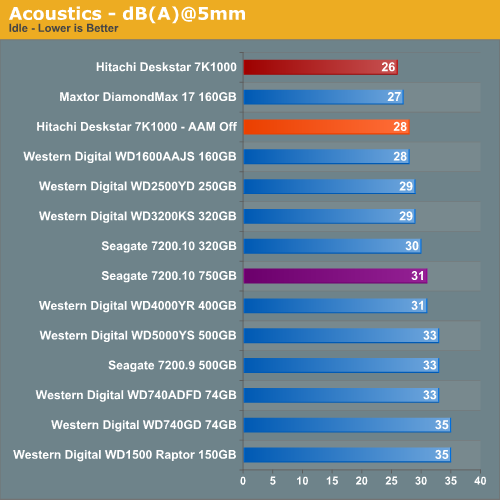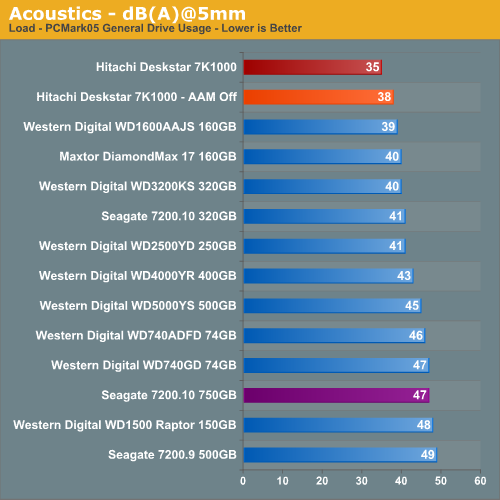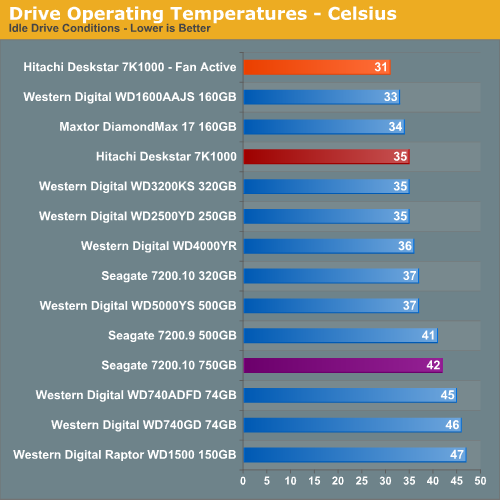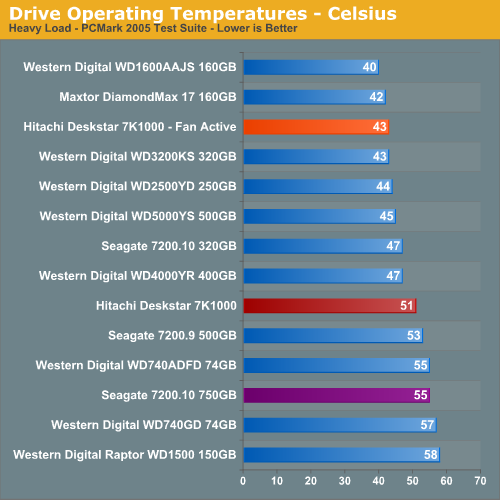Hitachi Deskstar 7K1000: Terabyte Storage arrives on the Desktop
by Gary Key on March 19, 2007 8:00 AM EST- Posted in
- Storage
Hard Drive Performance: Acoustics
Our acoustic test utilizes our standard test bed components but we implement AMD's Cool'n'Quiet technology and turn off the case fans to isolate as much case noise as possible during testing. Our OCZ power supply is nearly silent in these tests and our fanless ASUS 7600GS video card provides a further decrease in our case's ambient noise levels. Our drives are attached to the drive cage with rubber bushings to assist in isolating the noise of the drive without resulting harmonic changes due to the case design
Our acoustic tests are designed to measure the decibel levels while the system is at idle and also under load while running the General Hard Disk Drive Usage benchmark within PCMark 2005. We found through trail and error that this particular benchmark produces controlled readings across a wide range of applications within the benchmark. This particular benchmark utilizes 60% reads and 40% writes within the trace playback file.
The measurements are taken at a distance of 5 millimeters from the rear and front of the drive being tested in order to minimize surrounding environmental noise. We take our measurements over a period of twenty minutes, so idle measurements will include operating system interrupt and polling routines. We have noticed that unless we run a silent system in a near silent room that measurements taken from 1 meter are generally not meaningful due to ambient noise levels. There are exceptions like the Raptor series of drives but overall most modern desktop drives are quieter now than the other components in the system.
The reported measurements are based on an A-weighted decibel score that measures frequencies similar to the way the human ear responds to sound. We take a total of three measurements for each test. We then subtract the high and low scores and arrive at our findings by reporting the remaining score.


Our Hitachi Deskstar 7K1000 is the quietest drive that we have ever tested. We basically could not hear the drive and at times wondered if it was operating with AAM turned on. Even with AAM turned off, the drive was extremely quiet at idle and under load where it still scored better than our other test units. Our subjective opinion with AAM turned off is that the seek requests are muted greatly but still noticeable when compared to the other drives. The only other significant audible noise is a slight whirling sound as the drive spins up on a cold start or after a reboot. We just cannot emphasize enough how quiet this drive is in our test configuration with AAM enabled at the 128 setting. We even removed the rubber mounting grommets in our drive cage and did not notice any differences in acoustics or vibration levels. Our base dB(A) level in the room at time of testing was 25 dB(A).
Hard Drive Performance: Thermals
Our thermal tests utilize sensor readings via the S.M.A.R.T. (Self-Monitoring, Analysis and Reporting Technology) capability of the drives and are reported by utilizing the Active SMART 2.42 utility. We test our drives in an enclosed case environment without the front fan operational to simulate temperatures that could conceivably be reached in a SFF or HTPC case design. We typically find the reported numbers drop anywhere from 18% to 25% on average when the front fan is operational.
We typically let the drive idle for fifteen minutes before starting our idle thermal testing. Our load testing consists of taking the high temperature reading after looping the PCMark 2005 HD Suite benchmark five times. We also check load temps after looping our Nero Recode encoding test three times.


We expected the 7K1000 to run as warm as the Seagate 750GB due to the five platter design. However, under both idle and load conditions it operated significantly cooler than Seagate's large capacity PMR design. We have additional power and thermal management tests to run but at this time we were pleasantly surprised with the results. The load temperatures dropped from 51C to 43C and idle temps dropped from 35C to 31C with our front case fan operational. We highly recommend a fan be installed near the drive during normal operation. Our test room temperatures were 24C during these tests.
Our acoustic test utilizes our standard test bed components but we implement AMD's Cool'n'Quiet technology and turn off the case fans to isolate as much case noise as possible during testing. Our OCZ power supply is nearly silent in these tests and our fanless ASUS 7600GS video card provides a further decrease in our case's ambient noise levels. Our drives are attached to the drive cage with rubber bushings to assist in isolating the noise of the drive without resulting harmonic changes due to the case design
Our acoustic tests are designed to measure the decibel levels while the system is at idle and also under load while running the General Hard Disk Drive Usage benchmark within PCMark 2005. We found through trail and error that this particular benchmark produces controlled readings across a wide range of applications within the benchmark. This particular benchmark utilizes 60% reads and 40% writes within the trace playback file.
The measurements are taken at a distance of 5 millimeters from the rear and front of the drive being tested in order to minimize surrounding environmental noise. We take our measurements over a period of twenty minutes, so idle measurements will include operating system interrupt and polling routines. We have noticed that unless we run a silent system in a near silent room that measurements taken from 1 meter are generally not meaningful due to ambient noise levels. There are exceptions like the Raptor series of drives but overall most modern desktop drives are quieter now than the other components in the system.
The reported measurements are based on an A-weighted decibel score that measures frequencies similar to the way the human ear responds to sound. We take a total of three measurements for each test. We then subtract the high and low scores and arrive at our findings by reporting the remaining score.


Our Hitachi Deskstar 7K1000 is the quietest drive that we have ever tested. We basically could not hear the drive and at times wondered if it was operating with AAM turned on. Even with AAM turned off, the drive was extremely quiet at idle and under load where it still scored better than our other test units. Our subjective opinion with AAM turned off is that the seek requests are muted greatly but still noticeable when compared to the other drives. The only other significant audible noise is a slight whirling sound as the drive spins up on a cold start or after a reboot. We just cannot emphasize enough how quiet this drive is in our test configuration with AAM enabled at the 128 setting. We even removed the rubber mounting grommets in our drive cage and did not notice any differences in acoustics or vibration levels. Our base dB(A) level in the room at time of testing was 25 dB(A).
Hard Drive Performance: Thermals
Our thermal tests utilize sensor readings via the S.M.A.R.T. (Self-Monitoring, Analysis and Reporting Technology) capability of the drives and are reported by utilizing the Active SMART 2.42 utility. We test our drives in an enclosed case environment without the front fan operational to simulate temperatures that could conceivably be reached in a SFF or HTPC case design. We typically find the reported numbers drop anywhere from 18% to 25% on average when the front fan is operational.
We typically let the drive idle for fifteen minutes before starting our idle thermal testing. Our load testing consists of taking the high temperature reading after looping the PCMark 2005 HD Suite benchmark five times. We also check load temps after looping our Nero Recode encoding test three times.


We expected the 7K1000 to run as warm as the Seagate 750GB due to the five platter design. However, under both idle and load conditions it operated significantly cooler than Seagate's large capacity PMR design. We have additional power and thermal management tests to run but at this time we were pleasantly surprised with the results. The load temperatures dropped from 51C to 43C and idle temps dropped from 35C to 31C with our front case fan operational. We highly recommend a fan be installed near the drive during normal operation. Our test room temperatures were 24C during these tests.










74 Comments
View All Comments
Justin Case - Monday, March 19, 2007 - link
"Considering the importance of data integrity in today's systems"...? You mean like, in yesterday's (or perhaps tomorrow's) systems, data corruption was considered normal or acceptable?Gary Key - Tuesday, March 20, 2007 - link
It was not meant to infer that data integrity was not or will not be important.Spoelie - Tuesday, March 20, 2007 - link
No, but if you lost a hard drive before, the amount of data that would be gone is nothing compared to the amount of data you lose with current hard drives. It's always a BAD thing to lose data, but it's BAD² to lose data². So it's important² to keep data² safe ;pJustin Case - Wednesday, March 21, 2007 - link
"Data integrity" and "drive failure" are two different things. Most data integrity issues are related to bad sectors and corrupted data (and that is why Hitachi chose to go with more platters and lower areal density - less chance of localized data corruption, but actually a slightly higher chance of "catastrophic" drive failure - namely a head crash or a dead motor). The article's author got _that_ part right.The problem was what came after it. It was just as important to "keep data safe" last year (or the year before that, etc.) as it is this year, so qualifying it as "in today's systems" makes no sense.
Gary Key - Wednesday, March 21, 2007 - link
I changed it back to the original text. ;)
Griswold - Monday, March 19, 2007 - link
Looking at the benchmark charts, one thing that pops into the eye is that your world at AT, as far as HDDs are concerned, seems to revolve around Seagate and WD only.But theres quite a few other manufacturers out there that make good drives (that surpass many of the featured drives in one way or another) - this new Hitachi beast proves it.
Go ahead and test more Samsung, Fujitsu, Hitachi and even Excelstor drives.
Gholam - Thursday, March 22, 2007 - link
ExcelStor drives are refurbished IBM/Hitachi.Gary Key - Tuesday, March 20, 2007 - link
We finally have agreements with Samsung and Hitachi to provide review samples so expect to see reviews of their drives ramp up quickly. We are discussing a review format for SCSI based drives at this time and if we can do it right then expect to see this drive category reviewed later this year. We will also be introducing SSD reviews into our storage mix in the coming weeks. While I am at it, our Actual Application Test Suite will under several changes and be introduced in the 500GB roundup. Thanks for the comments. :)
Final Hamlet - Monday, March 19, 2007 - link
Hmm. Only vendor I am interested in seeing him added is Samsung. They have quite a market share here in Germany.JarredWalton - Monday, March 19, 2007 - link
My personal take is that for 99% of users, it doesn't really matter which brand you use. Seagate may win a few benchmarks, WD some others, Samsung, etc. some as well. In reality, I don't notice the difference between any of the HDDs I own and use on a regular basis. I have purchased Samsung, WD, Seagate, Hitachi, and Maxtor. Outside of the Raptors being faster in a few specific instances, without running a low level diagnostic I would never notice a difference between the drives. I suppose I'm just not demanding enough of HDDs?